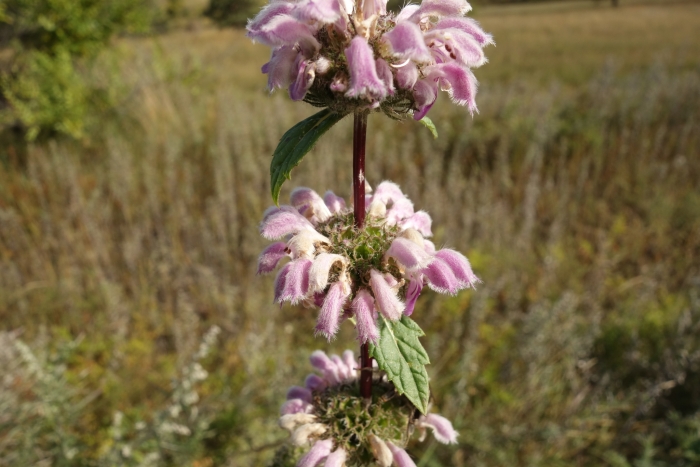Tuberous Jerusalem Sage
(Phlomoides tuberosa)
Tuberous Jerusalem Sage (Phlomoides tuberosa)
/
/

Aleksey Baushev
CC BY 4.0
Image By:
Aleksey Baushev
Recorded By:
Copyright:
CC BY 4.0
Copyright Notice:
Photo by: Aleksey Baushev | License Type: CC BY 4.0 | License URL: http://creativecommons.org/licenses/by/4.0/ | Rights Holder: Aleksey Baushev | Publisher: iNaturalist | Date Created: 2021-09-15T10:31:08-07:00 |


















































Estimated Native Range
Summary
Phlomoides tuberosa, commonly known as Tuberous Jerusalem Sage, is an evergreen perennial herb native to a range of habitats including open woodlands, grasslands, and rocky slopes in Southern and Eastern Europe, as well as parts of Asia. It reaches a typical height and width of 2-5 feet (0.6-1.5 meters), forming a clump of upright stems. The leaves are lance-shaped, and the plant produces dense spikes of tubular pink and purple flowers in late spring to early summer, which are highly attractive to bees and butterflies.
Tuberous Jerusalem Sage is valued for its showy flowers and its ability to thrive in a variety of garden settings. It is often used in perennial borders, wildflower gardens, and as a specimen plant. This plant prefers full sun but can tolerate partial shade, making it versatile for different garden designs. It requires medium amounts of water and well-drained soil to prevent root rot. The cultivar ’Amazone’, with its robust growth and particularly vibrant flowers, has earned the Royal Horticultural Society’s Award of Garden Merit, indicating its exceptional performance in gardens. Gardeners should be aware that in some conditions, Phlomoides tuberosa may spread vigorously, potentially becoming invasive.CC BY-SA 4.0
Tuberous Jerusalem Sage is valued for its showy flowers and its ability to thrive in a variety of garden settings. It is often used in perennial borders, wildflower gardens, and as a specimen plant. This plant prefers full sun but can tolerate partial shade, making it versatile for different garden designs. It requires medium amounts of water and well-drained soil to prevent root rot. The cultivar ’Amazone’, with its robust growth and particularly vibrant flowers, has earned the Royal Horticultural Society’s Award of Garden Merit, indicating its exceptional performance in gardens. Gardeners should be aware that in some conditions, Phlomoides tuberosa may spread vigorously, potentially becoming invasive.CC BY-SA 4.0
Plant Description
- Plant Type: Herb
- Height: 2-5 feet
- Width: 2-4.5 feet
- Growth Rate: Moderate
- Flower Color: Pink
- Flowering Season: Spring, Summer
- Leaf Retention: Evergreen
Growth Requirements
- Sun: Full Sun
- Water: Medium
- Drainage: Medium
Common Uses
Bird Garden, Border Plant, Butterfly Garden, Deer Resistant, Drought Tolerant, Rock Garden, Salt Tolerant, Showy Flowers
Natural Habitat
Open woodlands, grasslands, and rocky slopes
Other Names
Common Names: Lejonsvans, Röd Lejonsvans
Scientific Names: , Phlomis tuberosa, Phlomoides tuberosa, Phlomoides desertorum, Orlowia rossica, Phlomidopsis tuberosa, Phlomis desertorum, Phlomis glandulifera, Phlomis hypanica, Phlomis jailicola
GBIF Accepted Name: Phlomoides tuberosa (L.) Moench